Latest Podcasts
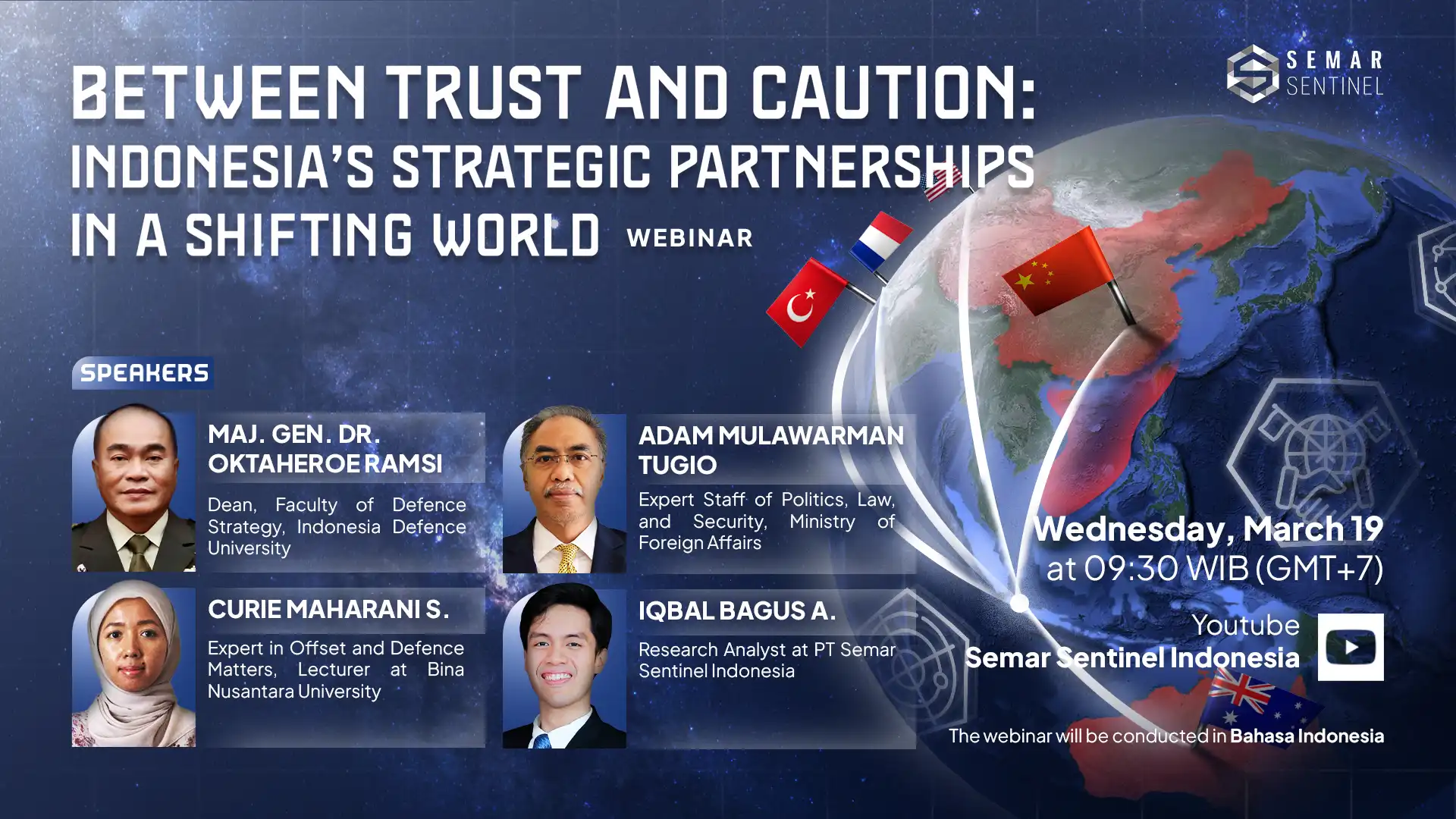
Between Trust and Caution: Indonesia’s Strategic Partnerships in a Shifting World

Between Trust and Caution: Indonesia’s Strategic Partnerships in a Shifting World
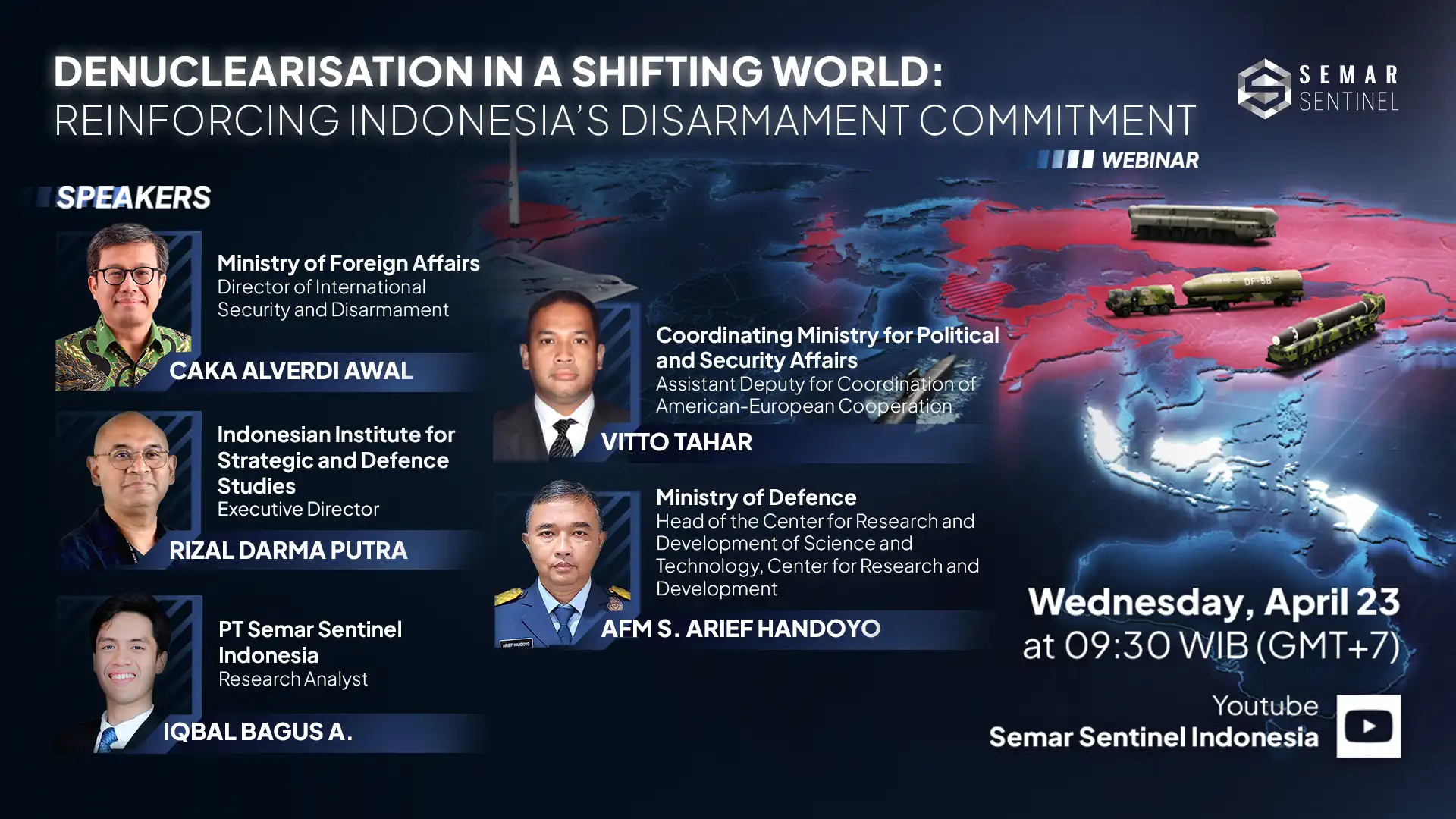
Denuclearisation in a Shifting World: Reinforcing Indonesia’s Disarmament Commitment

Denuclearisation in a Shifting World: Reinforcing Indonesia’s Disarmament Commitment

From Procurement to Progress: Ensuring the Viability of Defence Modernisation Projects

From Procurement to Progress: Ensuring the Viability of Defence Modernisation Projects
Browse All Topics of Our Podcasts
Explore a range of topics on our podcasts! Discover episodes that match your interests and dive into insightful discussions. Click to browse all topics.
Topics
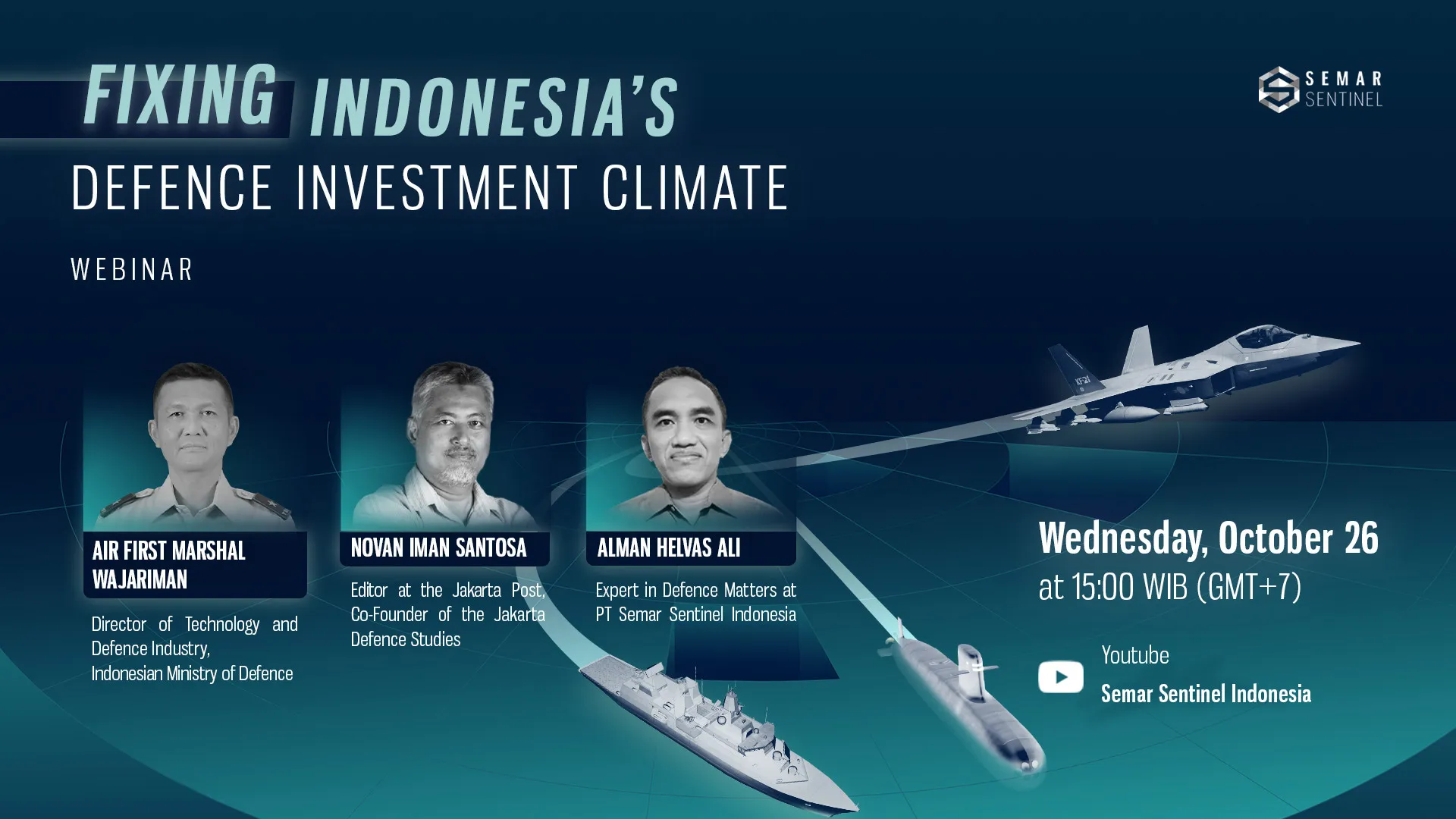
Fixing Indonesia’s Defence Investment Climate
Opening Remarks
Anastasia Febiola S

Anastasia Febiola S
Fixing Indonesia’s Defence Investment Climate
Summary
Our Research Coordinator & Head of Defence, Anastasia Febiola S., raised some questions about how Indonesia can boost foreign and domestic investments in its defence sector amid fiscal restrictions and geopolitical uncertainties. At the same time, the government must ensure that defence spending will benefit both private and state-owned defence companies in the country.
Speaker
AFM Wajariman
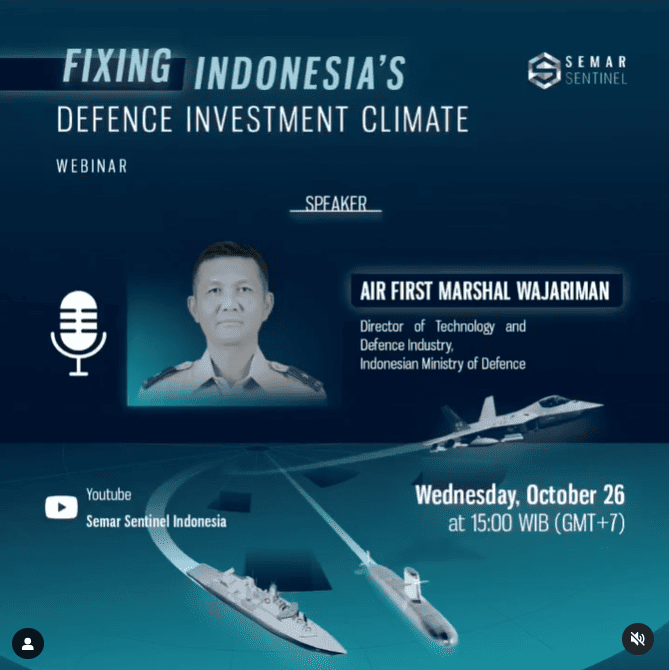
AFM Wajariman
Fixing Indonesia’s Defence Investment Climate
Summary
In our latest webinar, AFM Wajariman explained how Indonesia could maximise offsets from foreign arms procurement if it is able to buy weapon systems/platforms in large quantities. Additionally, AFM Wajariman mentioned several considerations within the Ministry of Defence in selection what kind of weapon systems/platforms it should develop domestically.
Speaker
Novan Iman Santosa
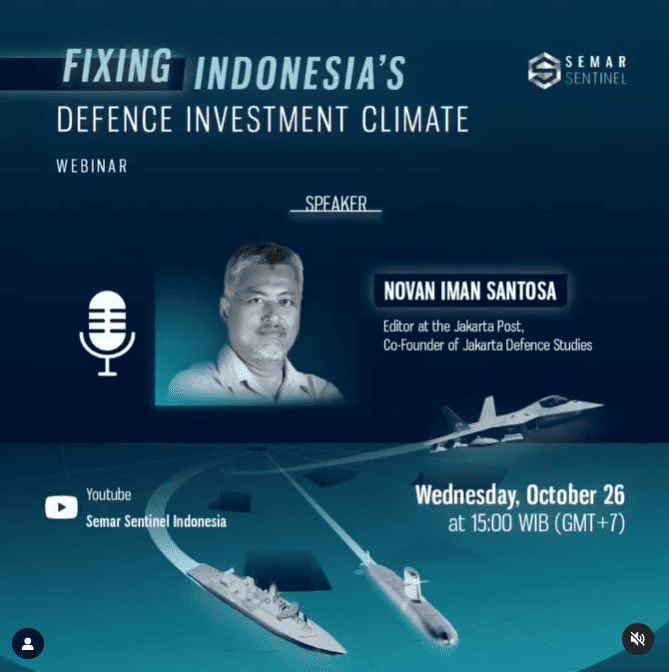
Novan Iman Santosa
Fixing Indonesia’s Defence Investment Climate
Summary
In our latest discussion, Novan Iman Santosa highlighted two important factors in maintaining a good defence investment climate in Indonesia: long-term order certainty and procurement plan consistency. Ideally, if these two factors are met, investors will be more interested in supporting the advancement of the Indonesian defence industry.
Speaker
Alman Helvas Ali
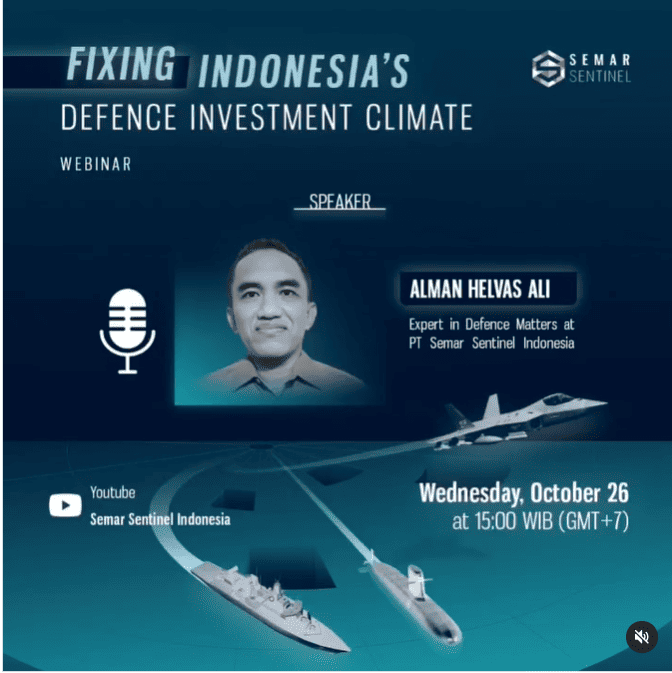
Alman Helvas Ali
Fixing Indonesia’s Defence Investment Climate
Summary
During our latest webinar, Alman Helvas Ali discussed the challenges and how Indonesia can attract foreign investors to help advance its domestic defence industry. It will be difficult for Indonesia to increase defence investment with the existing budget constraints.
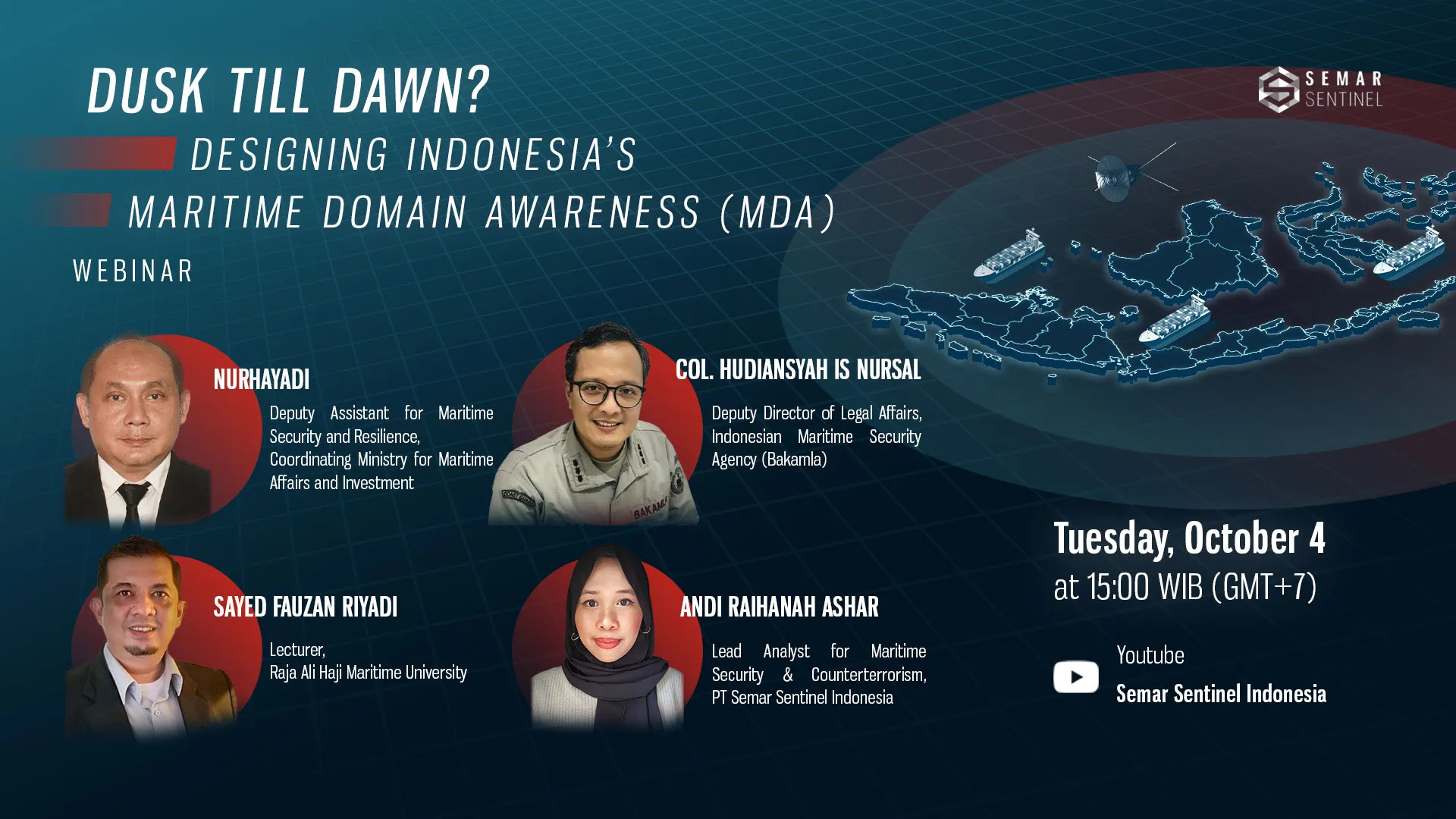
Dusk Till Dawn? Designing Indonesia’s Maritime Domain Awareness (MDA)
Opening Remarks
Alban Sciascia
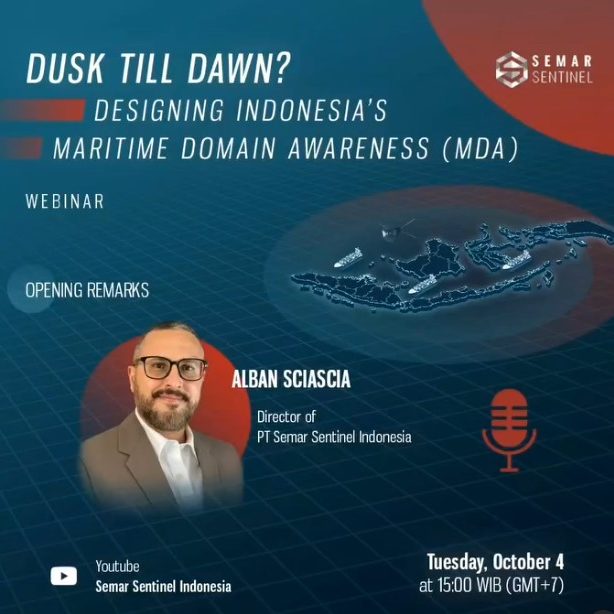
Alban Sciascia
Dusk Till Dawn? Designing Indonesia’s Maritime Domain Awareness (MDA)
Summary
Maritime Domain Awareness, or MDA, is the capacity to know what happens over, under and on the surface of the water. This capacity is important for several reasons: first, by knowing what is happening, the authorities could optimise measures to mitigate threats and risks and, by de facto, to protect a country’s sovereignty, as well as its resources and maritime domain users. MDA is even more important nowadays, as many cases of countries that do not respect the sovereignty of other states recently arise, leading to conflict.
Speaker
Nurhayadi
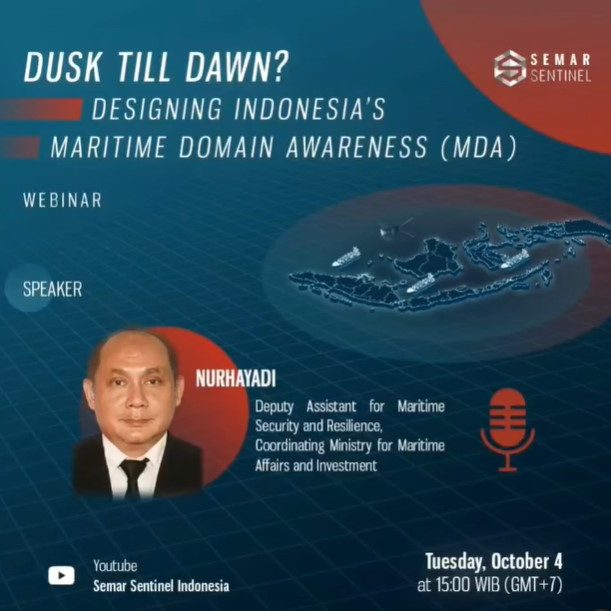
Nurhayadi
Dusk Till Dawn? Designing Indonesia’s Maritime Domain Awareness (MDA)
Summary
In our latest webinar, Nurhayadi, highlighted that several years ago, the Coordinating Ministry for Maritime and Investment Affairs worked alongside other ministries to carry out a 30-day operation at sea, and that was the time when the authorities were able to catch the perpetrators responsible for doing waste disposal. However, despite being successful in catching the perpetrators, Indonesia still frequently encounters up to four hours delay in receiving satellite data to this day, which has been hampering investigation and efforts to arrest the perpetrators.
Speaker
Col. Bakamla Hudiansyah
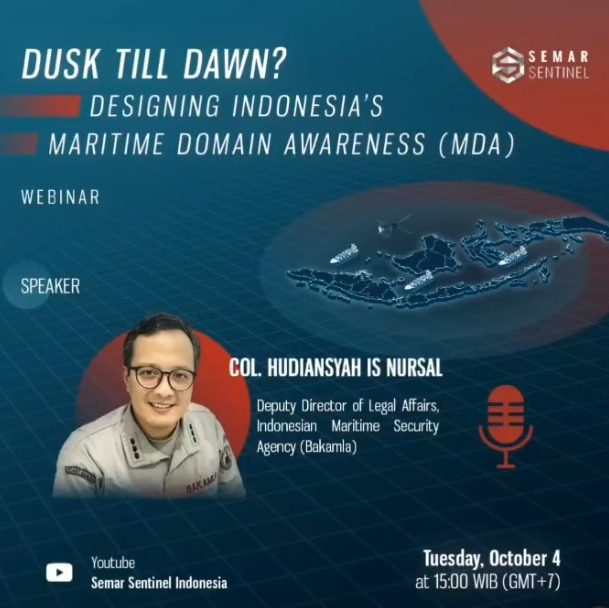
Col. Bakamla Hudiansyah
Dusk Till Dawn? Designing Indonesia’s Maritime Domain Awareness (MDA)
Summary
In our latest webinar, Col. Bakamla Hudiansyah Is Nursal, argued that based on discussions held in Bakamla, many countries with more experiences in maritime strategic thinking have built up their MDA capabilities. Indonesia, as the world’s largest archipelagic state, should do the same. However, a lack of transparency within ministries and agencies involved remains an issue, which has not been resolved yet.
Speaker
Sayed Fauzan Riyadi
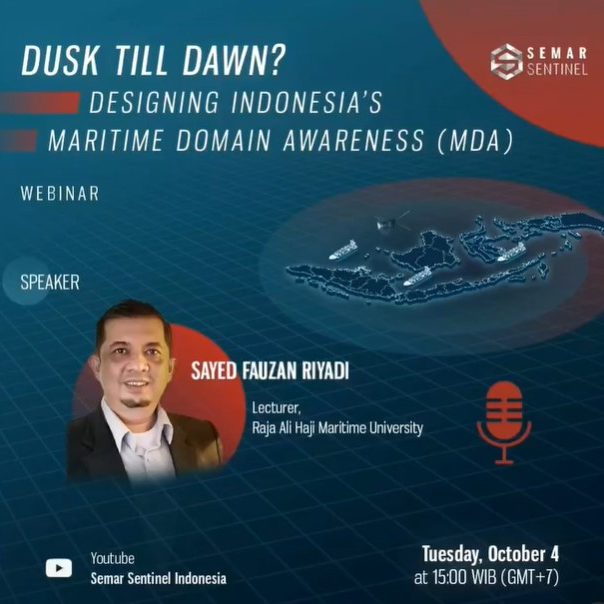
Sayed Fauzan Riyadi
Dusk Till Dawn? Designing Indonesia’s Maritime Domain Awareness (MDA)
Summary
In our latest webinar, Sayed Fauzan Riyadi, stated that he has classified six regimes of maritime governance, starting from the Traditional Regime; followed by four regimes in between, which are: Coastal State, Port State, Flag State, and Archipelagic State; and there is a regime of High Seas or Areas Beyond National Jurisdiction. For example, if Indonesia is seen as a Port State, meaning that Indonesia is a country that is responsible for ensuring the safety of its ports. Then, in the process of securing the port, the CIQs (Custom, Immigration, Quarantine) must be harmonised with other countries, and it could not possibly be implemented without a thorough port management system.
Speaker
Andi Raihanah Ashar
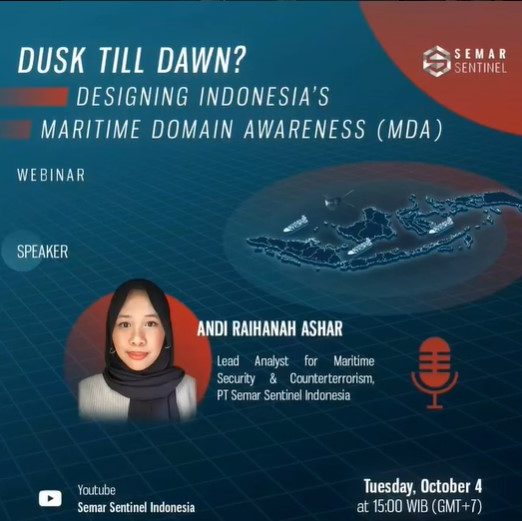
Andi Raihanah Ashar
Dusk Till Dawn? Designing Indonesia’s Maritime Domain Awareness (MDA)
Summary
In our latest webinar, Andi Raihanah Ashar, highlighted the tough responsibility of relevant stakeholders to manage various institutions, which actually could be done by determining a clear chain of command, and how to utilise the best assets, at the best moment, at the right time. Furthermore, the solution that can be considered by the government is to detect the electronic signature of each ship through radio frequency signal detection.
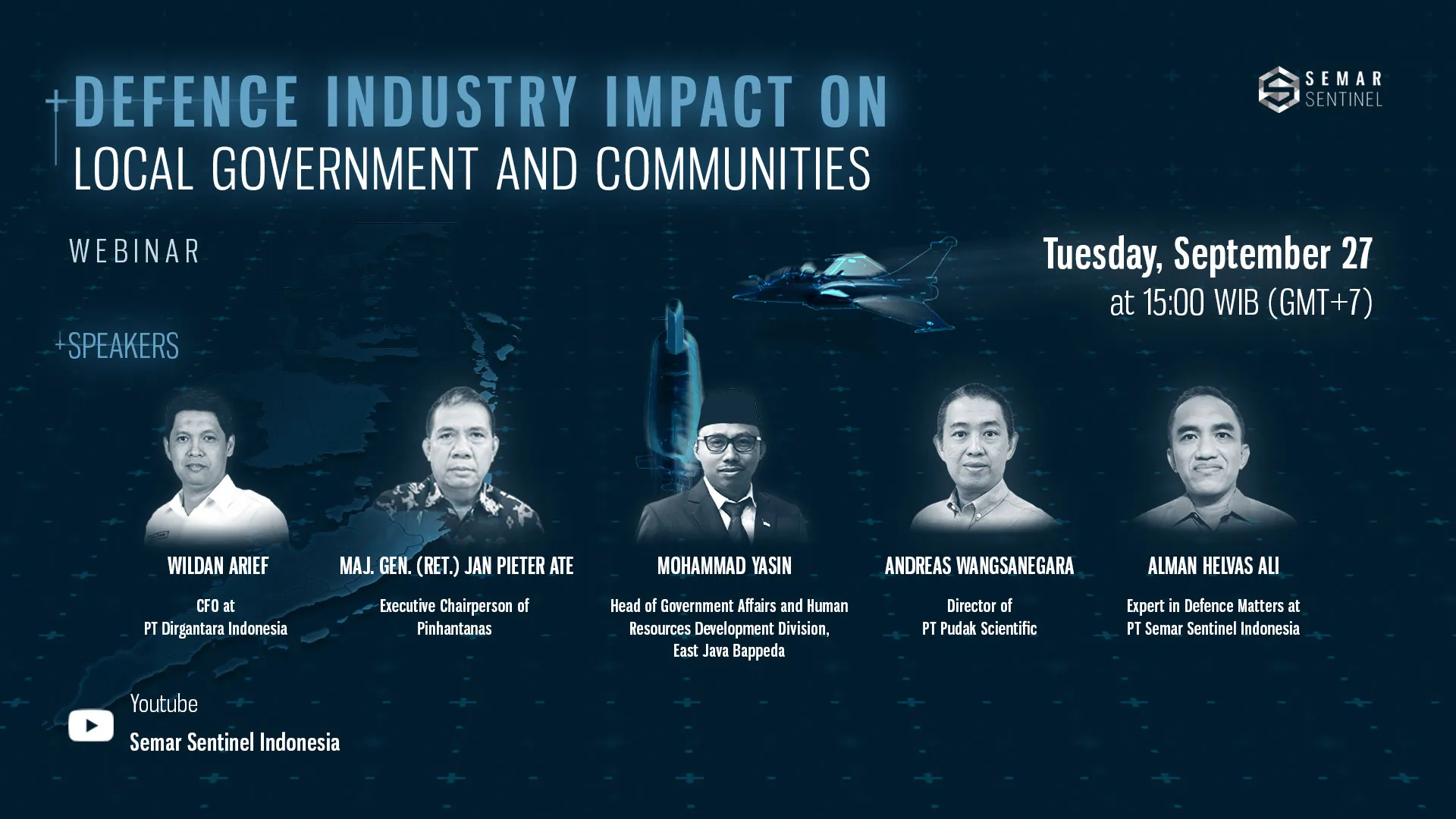
Defence Industry Impact on Local Government and Communities
Opening Remarks
Anastasia Febiola S
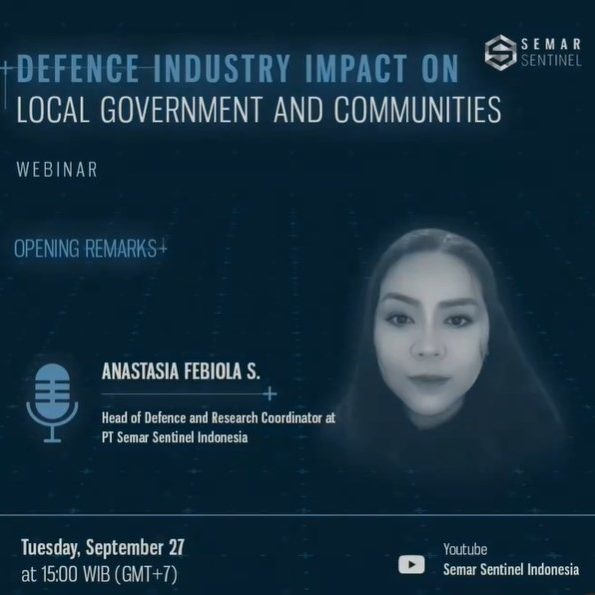
Anastasia Febiola S
Defence Industry Impact on Local Government and Communities
Summary
Consideration needs to be given to CTLCO (Countertrade, Local Components, and Offsets) programmes within defence spending which can benefit all parties, including local actors. In this sense, the government has a significant opportunity to evaluate the potential economic value that can be obtained from defence spending, which can also support the development of industrial sectors in the area and embrace local communities amid the current economic difficulties.
Speaker
Wildan Arief
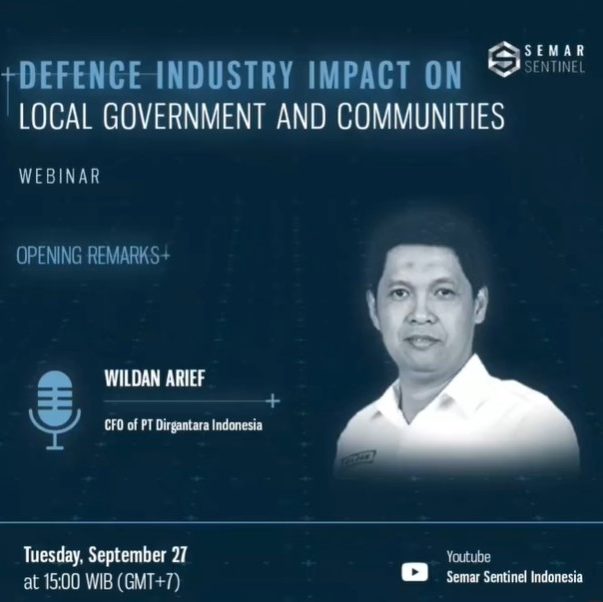
Wildan Arief
Defence Industry Impact on Local Government and Communities
Summary
In our webinar titled “Defence Industry Impact on Local Government and Communities”, Wildan Arief, highlighted that PT Dirgantara Indonesia strives to contribute strongly from the knowledge side, where the high-tech industry serves as a learning centre for students and the surrounding community. Furthermore, PT Dirgantara Indonesia can participate in improving the regional economy in three ways, including by creating jobs, expanding new business opportunities for local residents, and increasing the growth index in the industrial area.
Speaker
Maj, Gen. (Ret.) Jan Pieter Ate
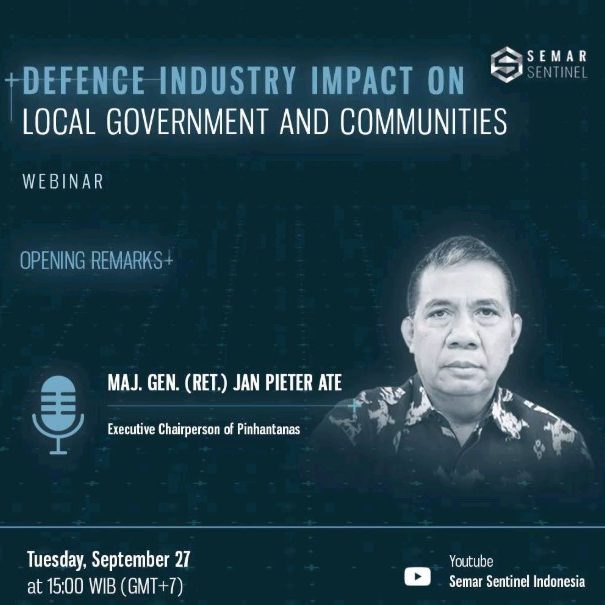
Maj, Gen. (Ret.) Jan Pieter Ate
Defence Industry Impact on Local Government and Communities
Summary
In our webinar titled “Defence Industry Impact on Local Government and Communities”, Maj. Gen. (Ret.) Jan Pieter Ate, argued that the contribution of the defence industry towards regional governments could be in the form of security and stability for the local administration and communities. Furthermore, the central government could communicate with the regional authorities, in terms of domestic defence industry capability, so that the local authorities can have a role in the development of the defence industry.
Speaker
Kukuh Tri Sandi
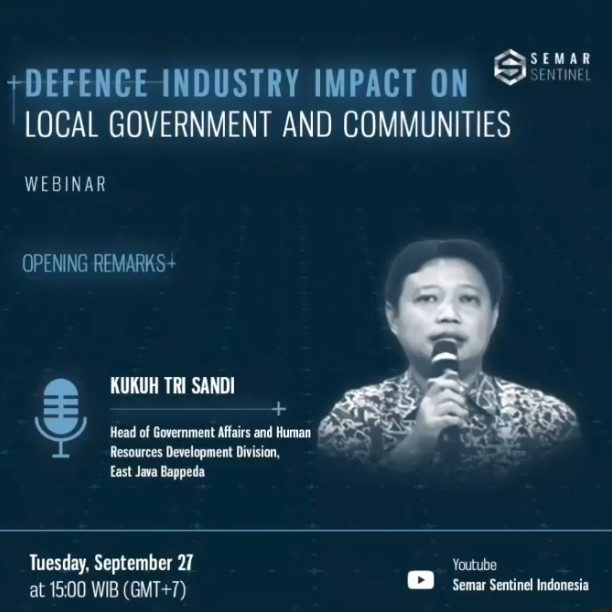
Kukuh Tri Sandi
Defence Industry Impact on Local Government and Communities
Summary
In our webinar titled “Defence Industry Impact on Local Government and Communities”, Kukuh Tri Sandi, argued that the East Java Regional Development Planning Agency (Bappeda) supports the development and modernisation of the defence industry through human resource capacity building. A number of ways to do this is by increasing the competitiveness in vocational schools and training centres.
Speaker
Andreas Wangsanegara
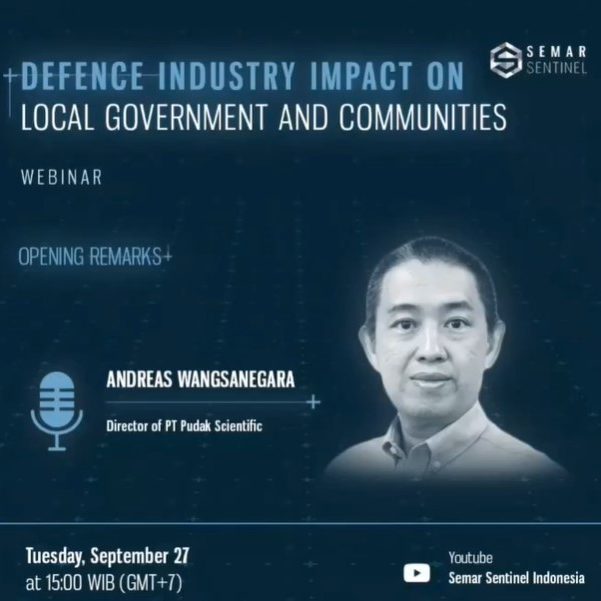
Andreas Wangsanegara
Defence Industry Impact on Local Government and Communities
Summary
In our webinar titled “Defence Industry Impact on Local Government and Communities”, Andreas Wangsanegara as the Director of PT Pudak Scientific, highlighted that the company’s contributions to the local economy are by creating and using skilled labour, providing job opportunities, internships, as well as conducting joint research with educational institutions, thus producing high-value added output.
Speaker
Alman Helvas Ali
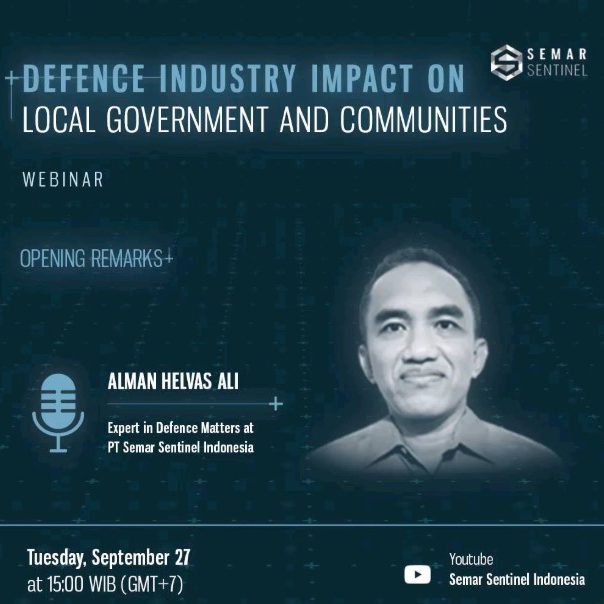
Alman Helvas Ali
Defence Industry Impact on Local Government and Communities
Summary
In our webinar titled “Defence Industry Impact on Local Government and Communities”, Alman Helvas Ali, stated that Indonesian defence industry has a lot of potential to increase its contribution to the national economy, including high-tech mastery, a small number of defence or non-defense industries that are part of global supply chains, and how to create a domestic supply chains.
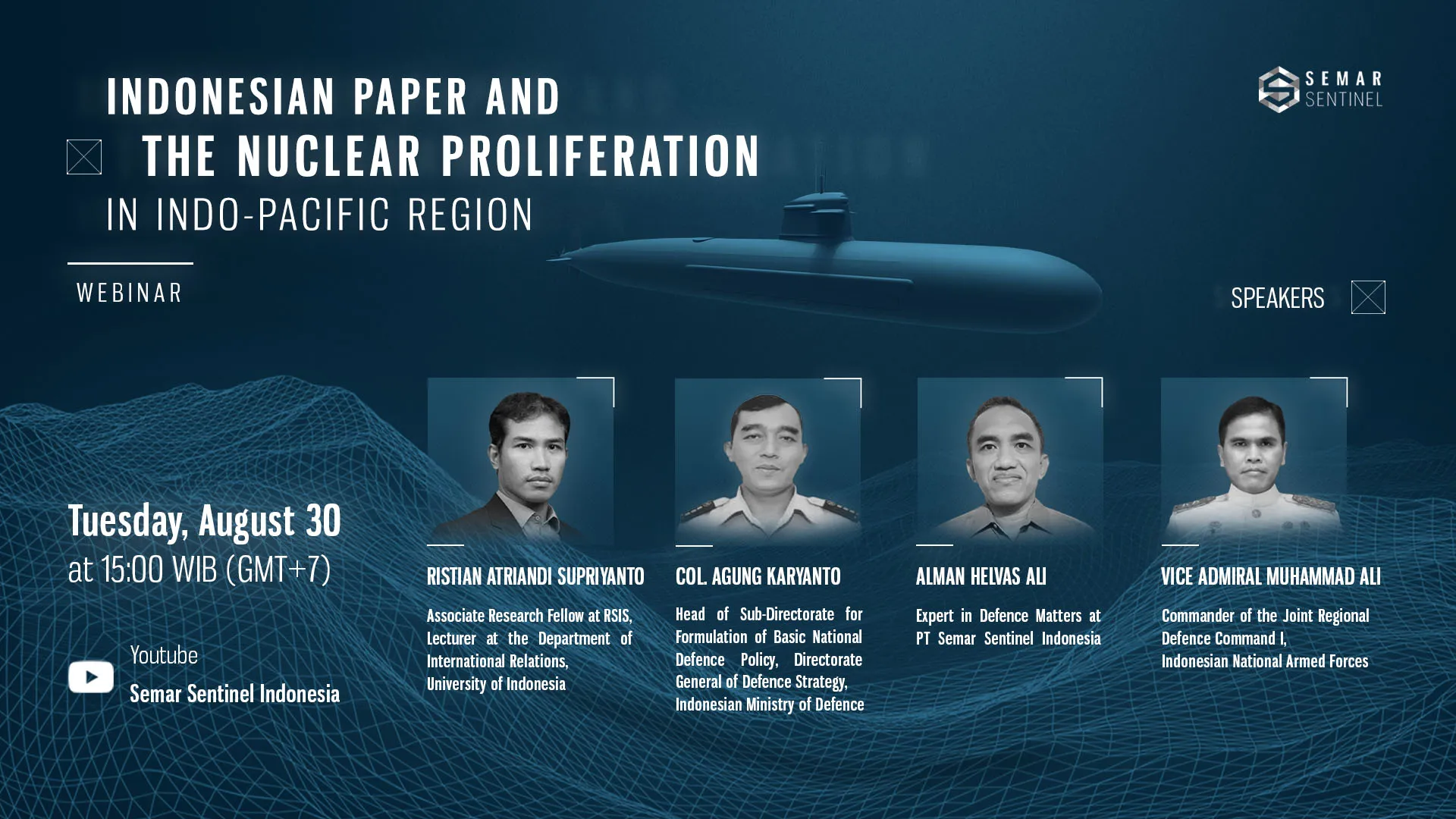
Indonesian Paper and the Nuclear Proliferation in Indo-Pacific Region
Opening Remarks
Anastasia Febiola S
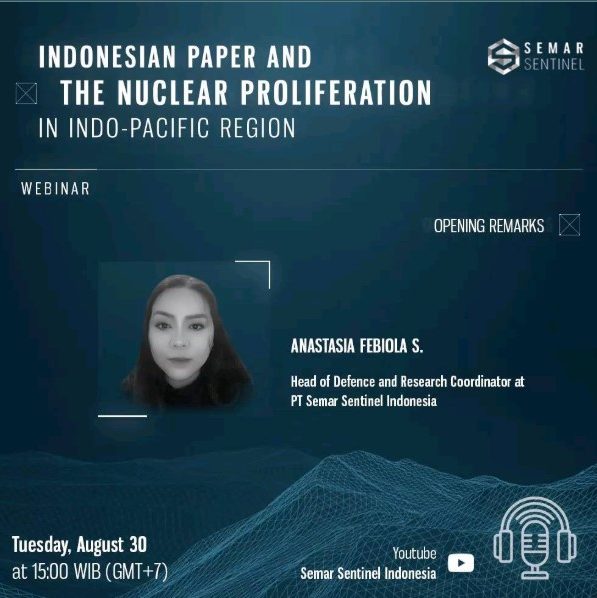
Anastasia Febiola S
Indonesian Paper and the Nuclear Proliferation in Indo-Pacific Region
Summary
Jakarta’s concerns regarding the proliferation of nuclear-powered submarines, might be directed to the establishment of the AUKUS (Australia, United Kingdom, United States) alliance and Canberra’s plan to acquire nuclear-powered submarines. However, it is also important to take into consideration the evolution of the security environment, especially in the Indo-Pacific region, where tensions in the region have continued to rise in recent weeks. At the same time, Indonesia also needs to operate major weapons systems that have a deterrent effect, in order to protect its sovereignty and national interests.
Speaker
Ristian Atriandi Supriyanto
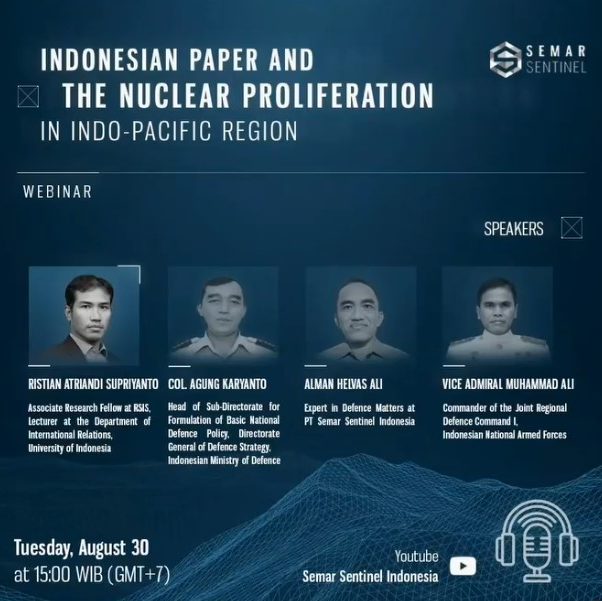
Ristian Atriandi Supriyanto
Indonesian Paper and the Nuclear Proliferation in Indo-Pacific Region
Summary
In our latest webinar, Ristian Atriandi Supriyanto, stated that Indonesia’s strategic environment has become increasingly complex with the emergence of AUKUS (Australia, United Kingdom, United States) and QUAD (Quadrilateral Security Dialogue) alliances, as well as competitive interactions between superpowers in the Indo-Pacific region. M. Supriyanto argued that the most obvious impact is the increasing density of foreign military traffic passing through Indonesian territory, including nuclear-powered submarines.
Speaker
Col. Agung Karyanto
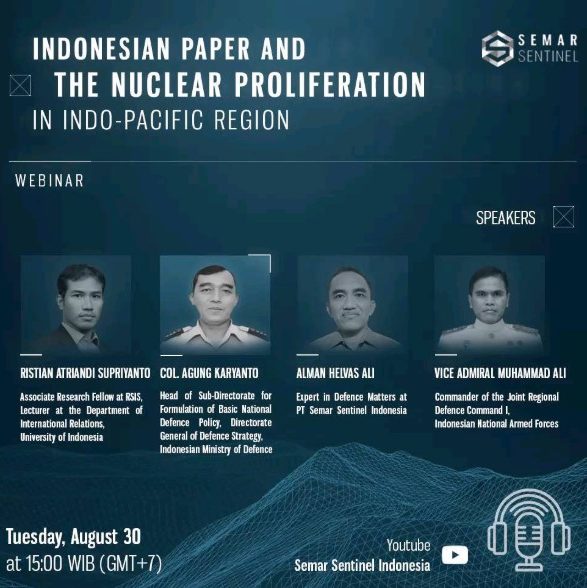
Col. Agung Karyanto
Indonesian Paper and the Nuclear Proliferation in Indo-Pacific Region
Summary
In our latest webinar, Col. Agung Karyanto, highlighted that Indonesia would continue upholding its commitment of zero-nuclear policy, including to not develop nuclear energy for military purposes, when dealing with the evolution of security context in the Indo-Pacific region. In terms of nuclear-powered submarine proliferation, M. Karyanto argued that Jakarta would need to address the issue through ‘special’ policy.
Speaker
Alman Helvas Ali
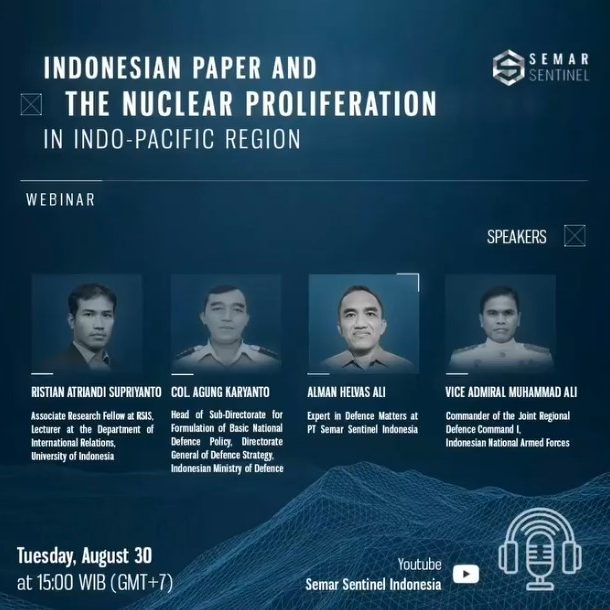
Alman Helvas Ali
Indonesian Paper and the Nuclear Proliferation in Indo-Pacific Region
Summary
In our latest webinar, Alman Helvas Ali, stated that diesel-electric submarines have limitations in terms of endurance compared to nuclear-powered submarines. However, the former still have advantages over nuclear-powered submarines, especially in terms of noise from machinery vibrations. Such cases can be seen from the naval fleets of developed countries such as the United States, where they are not only relying on passive sonar to detect diesel-electric submarines, but they are also using low frequency sonar arrays.
Speaker
VADM Muhammad Ali
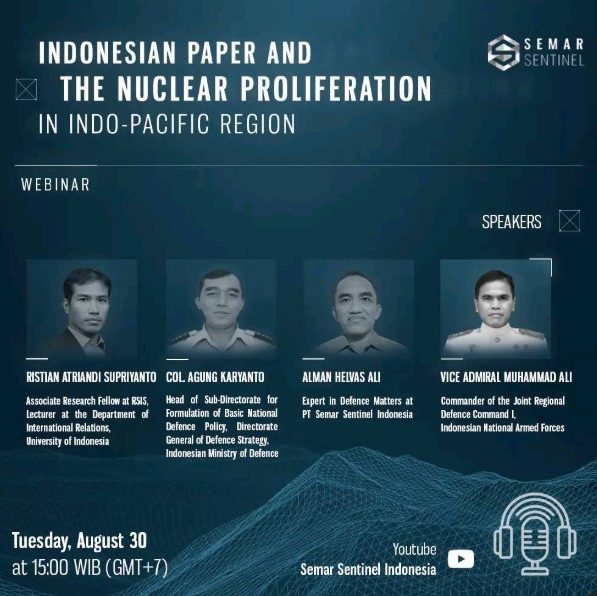
VADM Muhammad Ali
Indonesian Paper and the Nuclear Proliferation in Indo-Pacific Region
Summary
In our latest webinar, VADM Muhammad Ali, highlighted that the Indonesian government should choose and implement the right strategy in dealing with threats or possible intrusions – including other country’s submarines – especially noting its geographical conditions. Furthermore, with the escalation of tension in the South China Sea, nuclear-powered submarines passing through the area become one of Indonesia’s main concerns.
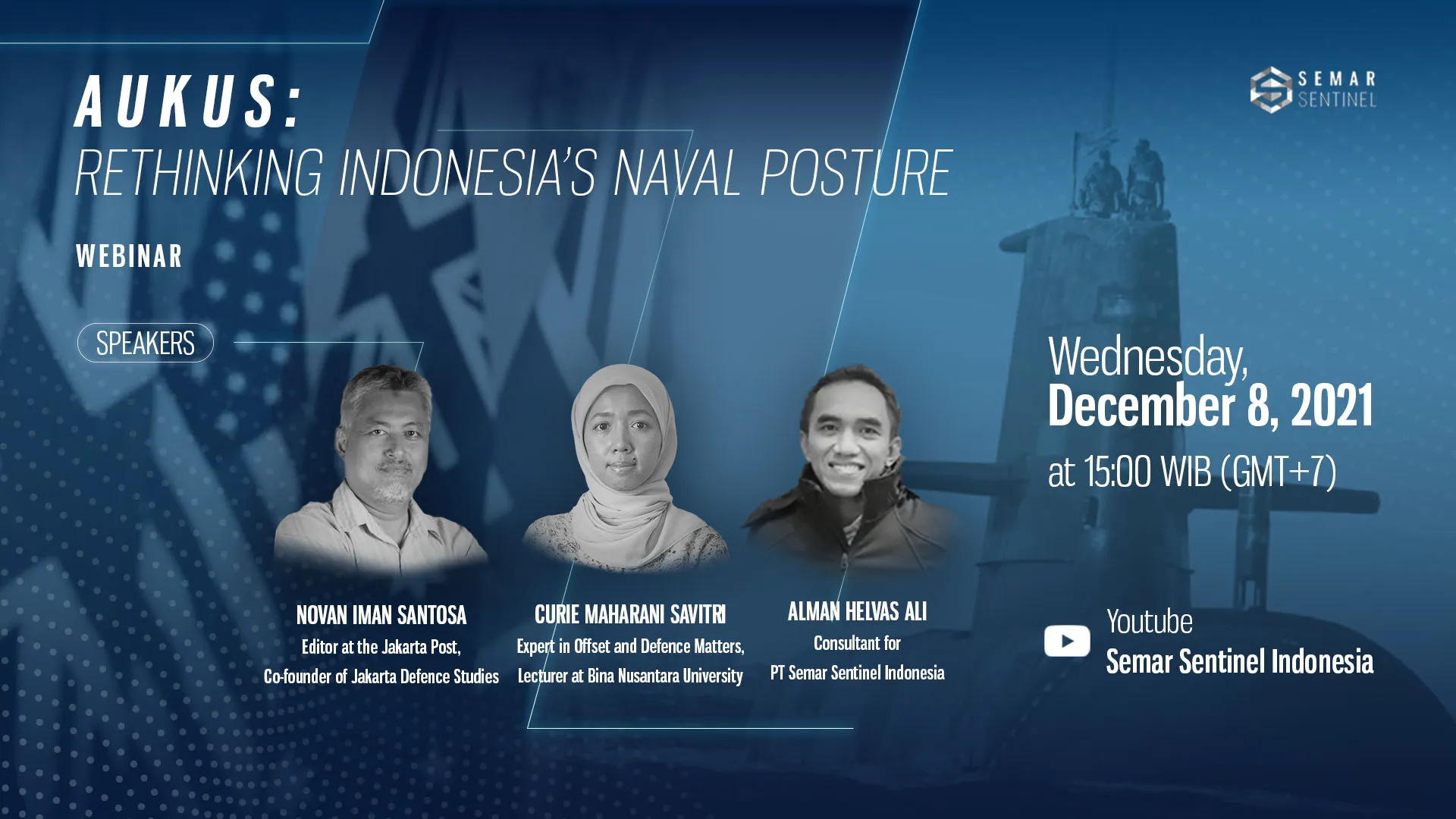
AUKUS: Rethinking Indonesia’s Naval Posture
Speaker
Curie Maharani Savitri
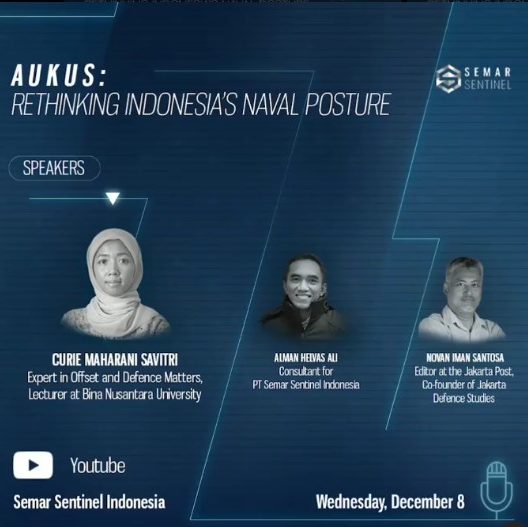
Curie Maharani Savitri
AUKUS: Rethinking Indonesia’s Naval Posture
Summary
Curie Maharani Savitri explained that the reasons preventing Indonesia from embracing an A2/AD posture are not only due to the failure of obtaining the necessary technology, but also politically based. The posture to be adopted in the coming months will also depend on how the government will ponder over the AUKUS alliance.
Speaker
Novan Iman Santosa
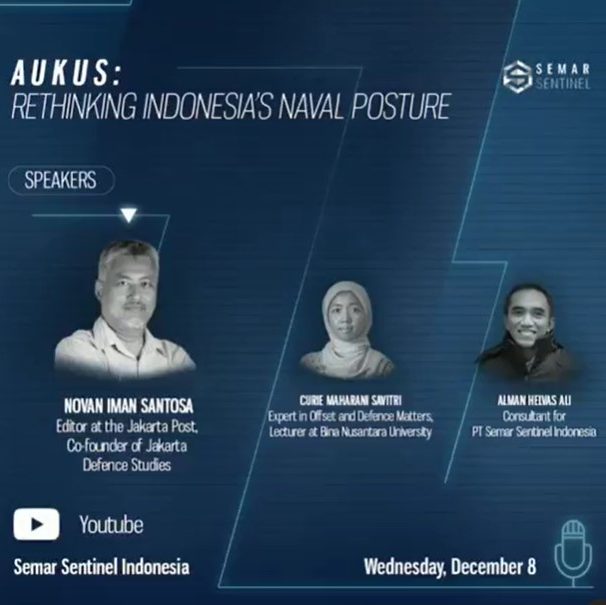
Novan Iman Santosa
AUKUS: Rethinking Indonesia’s Naval Posture
Summary
Novan Iman Santosa argued that even though Indonesia has no intention of surveying the South China Sea, long-range capabilities are a necessity to conduct continuous and efficient patrols across the country.
Speaker
Alman Helvas Ali
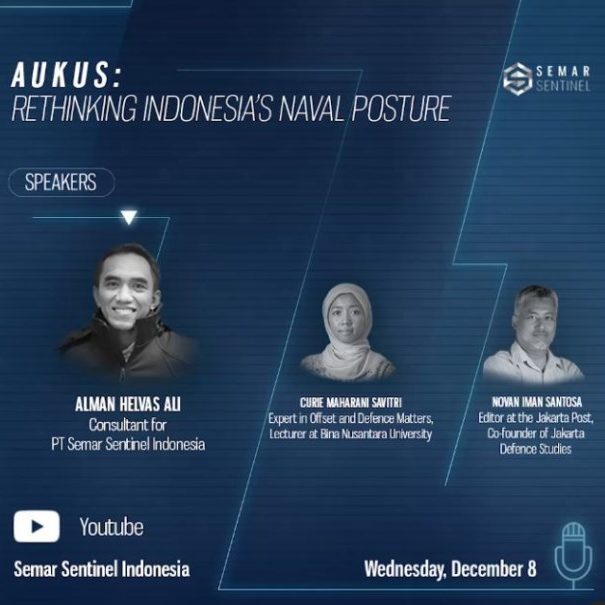
Alman Helvas Ali
AUKUS: Rethinking Indonesia’s Naval Posture
Summary
Alman Helvas Ali reasoned that whether threats originate from AUKUS and/or China, Indonesia ought to modernise its forces, and particularly the navy by obtaining adequate submarines and major surface combatants.

Attracting More Foreign Investment in Indonesia Defence Industry
Speaker
Dr. Ir. Jupriyanto
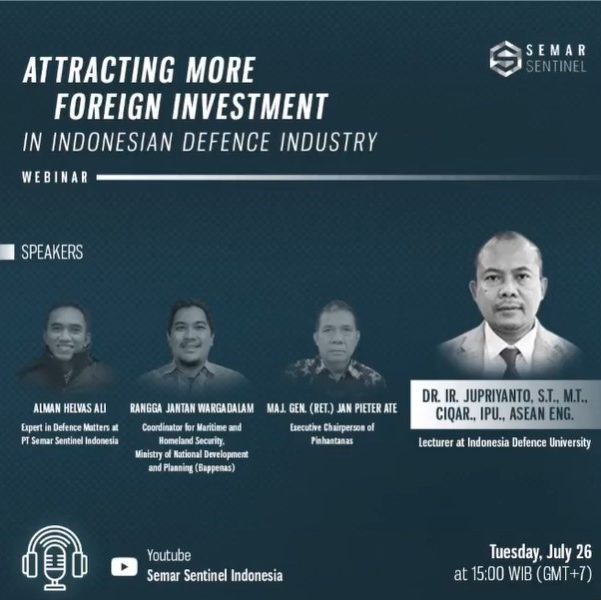
Dr. Ir. Jupriyanto
Attracting More Foreign Investment in Indonesia Defence Industry
Summary
In our latest webinar, Dr. Ir. Jupriyanto stated that a country must be careful when building its domestic defence industry as it will have a significant impact on the nation’s geostrategic position. In the case of Indonesia, M. Jupriyanto added that Jakarta needs a strong military power with sophisticated defence technologies to support its geostrategic position. To obtain these technologies, M. Jupriyanto argued that the government must also develop other sectors, including component manufacturers, which would eventually support the whole defence industry ecosystem.
Speaker
Rangga Jantan Wargadalam
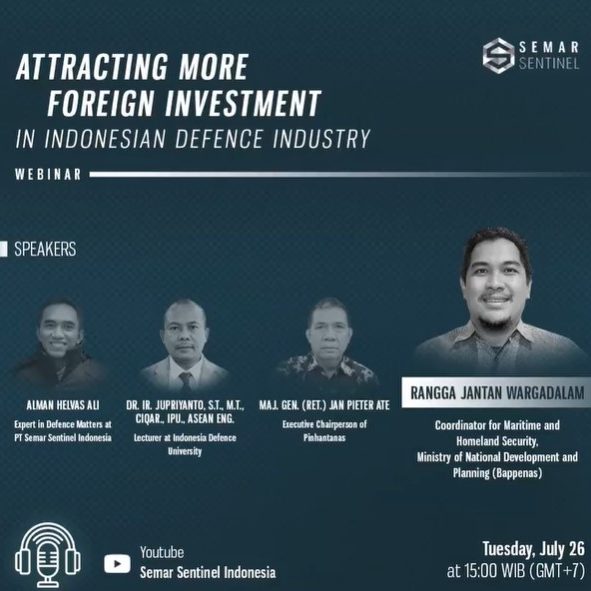
Rangga Jantan Wargadalam
Attracting More Foreign Investment in Indonesia Defence Industry
Summary
In our latest webinar, Rangga Jantan Wargadalam of the Ministry of National Development and Planning revealed that the function of the defence industry is not only to build defence capabilities but also to contribute to the country’s economic growth through job creation and investment in national industries. Countries with higher defence spending, especially the developed ones, focus on developing the quality of their human capital, technology, and infrastructures, which eventually create a ‘safe’ and ‘encouraging’ environment for investment.
Speaker
Maj, Gen. (Ret.) Jan Pieter Ate
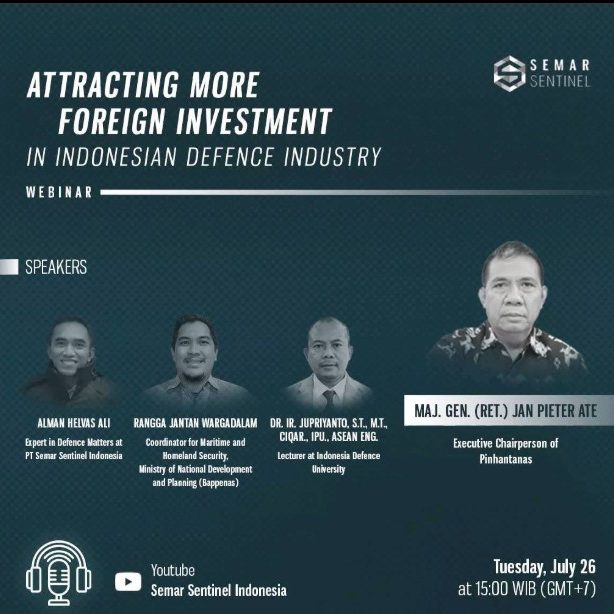
Maj, Gen. (Ret.) Jan Pieter Ate
Attracting More Foreign Investment in Indonesia Defence Industry
Summary
In our latest webinar, Maj. Gen. (Ret.) Jan Pieter Ate argued that Indonesia, as one of the largest militaries in Asia and even in Southeast Asia, is in dire need of Foreign Direct Investment (FDI) to fulfill its equipment and weapons requirements, especially since many are old and obsolete. By attracting FDI, M. Ate stated that Indonesia could create more value for its defence industry, such as by being a regional production hub and part of a global supply chain.
Speaker
Alman Helvas Ali
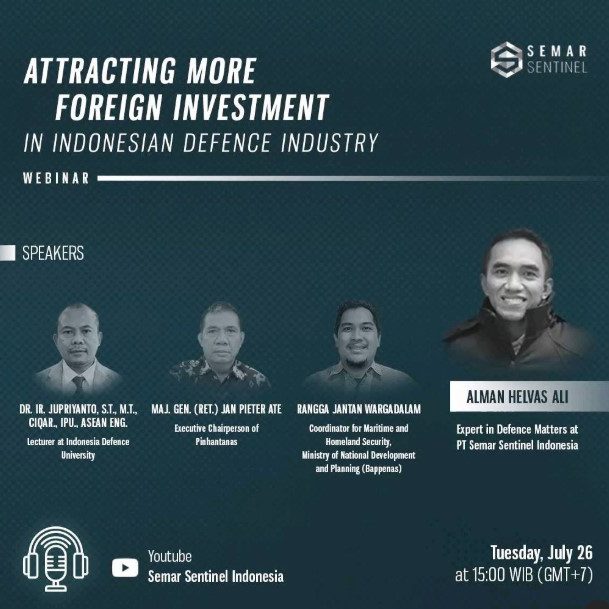
Alman Helvas Ali
Attracting More Foreign Investment in Indonesia Defence Industry
Summary
In our latest webinar, Alman Helvas Ali emphasised that Indonesia’s defence industry sector is open to foreign direct investment (FDI) with some restrictions on capital ownership. Nonetheless, based on the experience of other countries, such as India, Australia, the Philippines, as well as Thailand, ownership restrictions are not a factor that determines the success or failure of FDI in the defence industry. M. Ali further argued that in order to attract FDI, Indonesia must be able to overcome the challenges that the country often faces such as export licence and budget constraints.
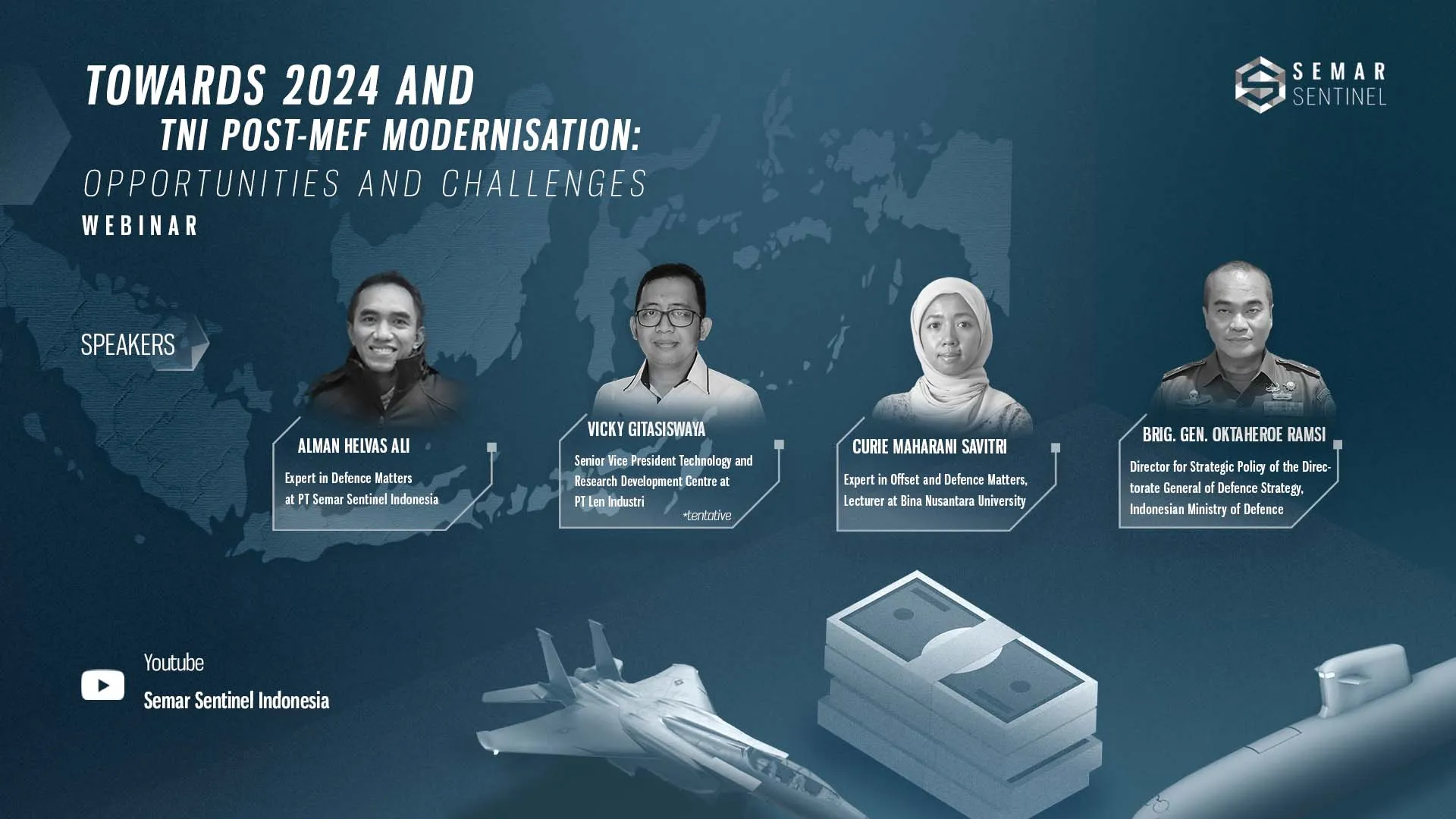
Towards 2024 and TNI Post-MEF Modernisation
Opening Remarks
Anastasia Febiola S
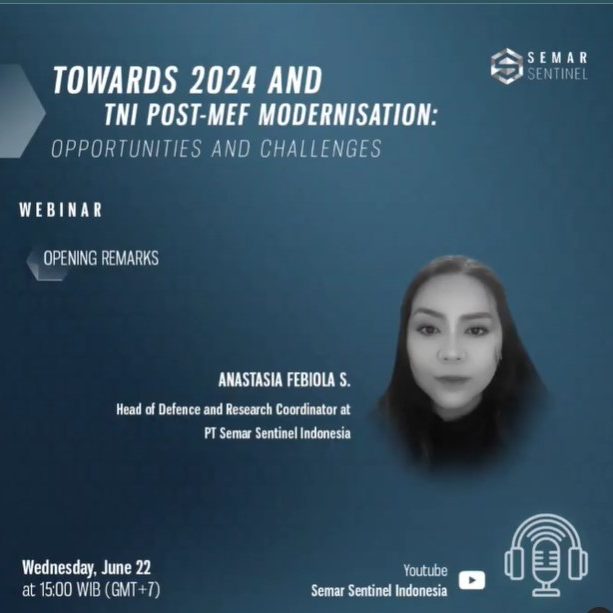
Anastasia Febiola S
Towards 2024 and TNI Post-MEF Modernisation
Summary
The progress of the Minimum Essential Forces (MEF) has reached 62% until 2021, but is predicted that it will not be able to meet the target of 100% by the end of 2024. In fact, the Commander of the Indonesian National Armed Forces (TNI), Gen. Andika Perkasa, also stated that the modernisation progress will only reach 70% by 2024, due to various factors which eventually hinder the MEF plan.
Speaker
Alman Helvas Ali
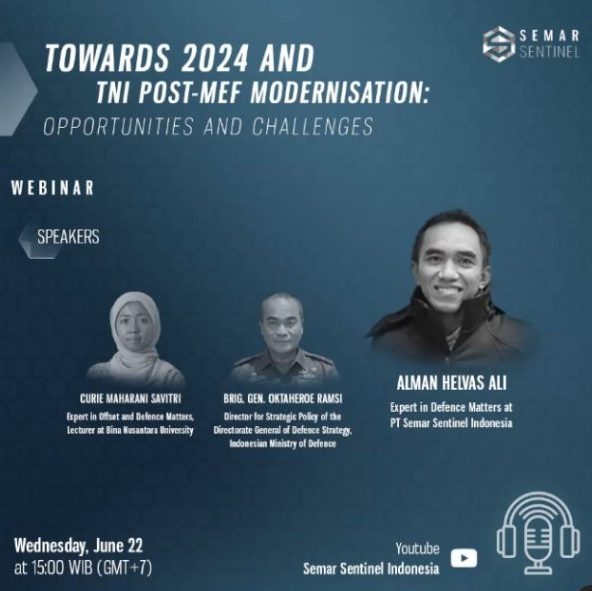
Alman Helvas Ali
Towards 2024 and TNI Post-MEF Modernisation
Summary
In our latest webinar, Alman Helvas Ali reminded that the Indonesian government should have backup plans for its National Armed Forces (TNI) modernisation. M. Ali also highlighted the importance of focusing on the right priorities due to budget constraints, which could hinder procurement programmes.
Speaker
Brig. Gen. Oktaheroe Ramsi
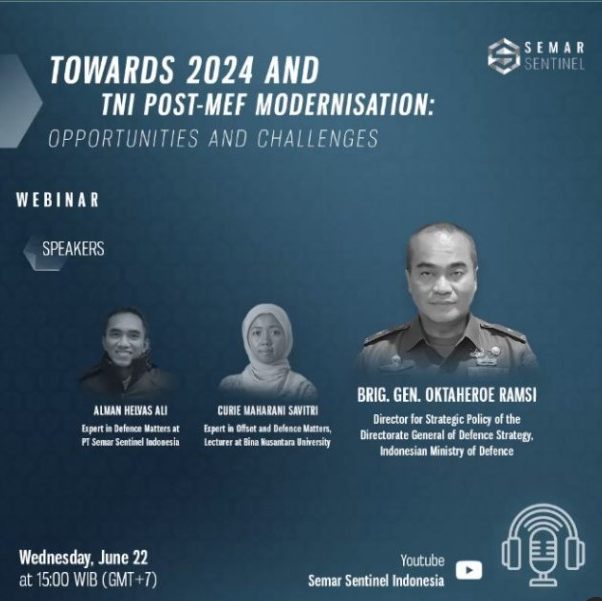
Brig. Gen. Oktaheroe Ramsi
Towards 2024 and TNI Post-MEF Modernisation
Summary
In our latest webinar, Brig. Gen. Oktaheroe Ramsi stated that Indonesia’s defence posture and modernisation plan is focused on developing the Indonesian National Armed Forces (TNI) strength. However, the modernisation of the armed forces, especially long-term planning, cannot be implemented quickly due to numerous considerations involving all levels of government.
Speaker
Curie Maharani Savitri
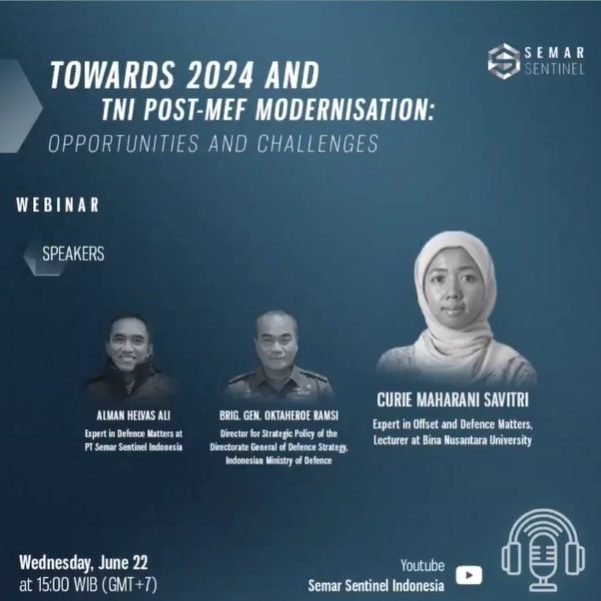
Curie Maharani Savitri
Towards 2024 and TNI Post-MEF Modernisation
Summary
In our latest webinar, Curie Maharani Savitri argued that amidst limited fiscal capacity, Indonesia’s national armed forces modernisation plan should be based on cost-effective solutions. For example, the French (Defence) Research and Development Agency, operates a dedicated division that monitors technological advancement in the commercial sector. Once there is a technology that has the potential to be developed into defence technology, they will try to develop and support it even if it is not 100% mature.
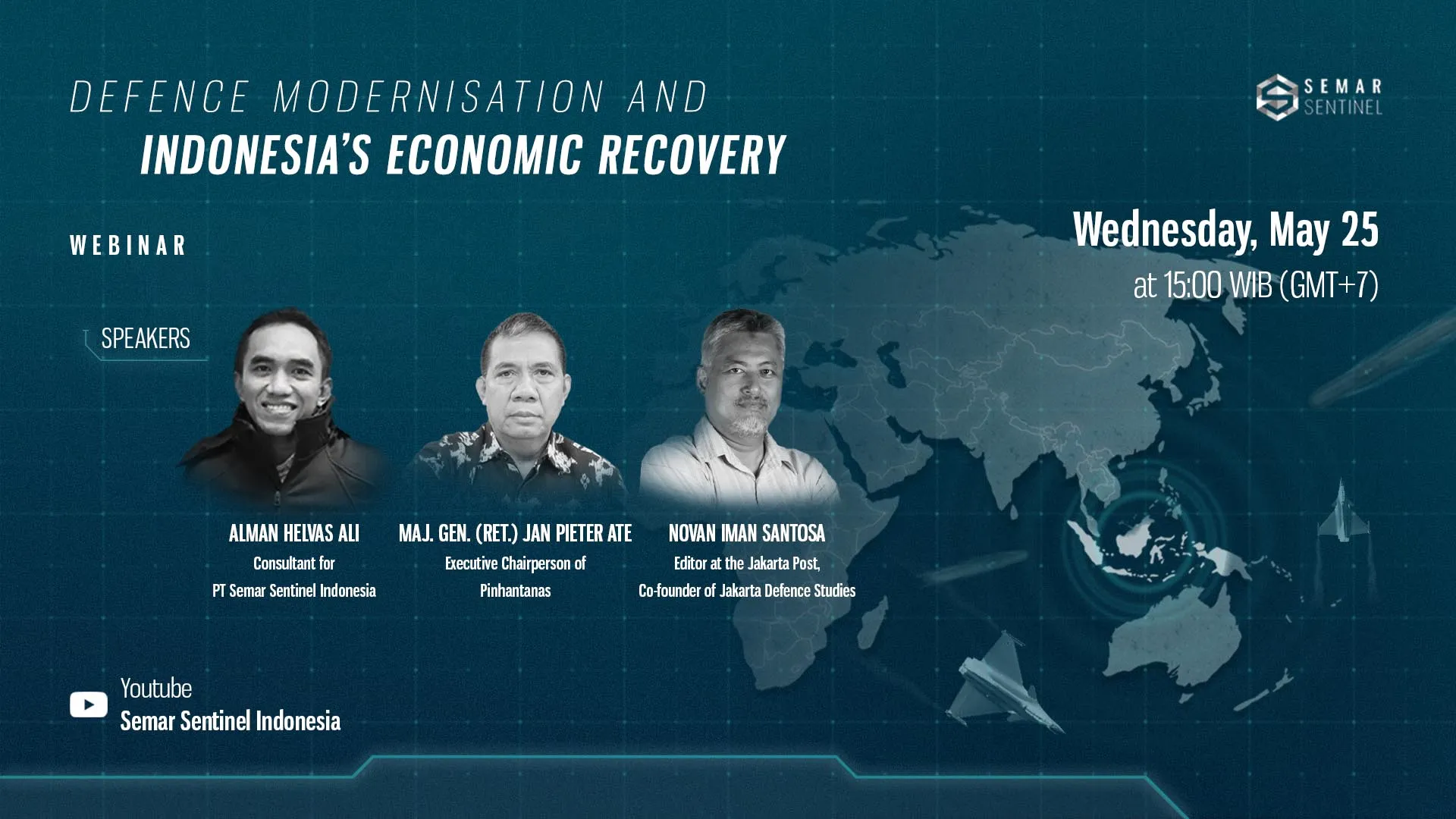
Defence Modernisation and Indonesia’s Economic Recovery
Opening Remarks
Anastasia Febiola S
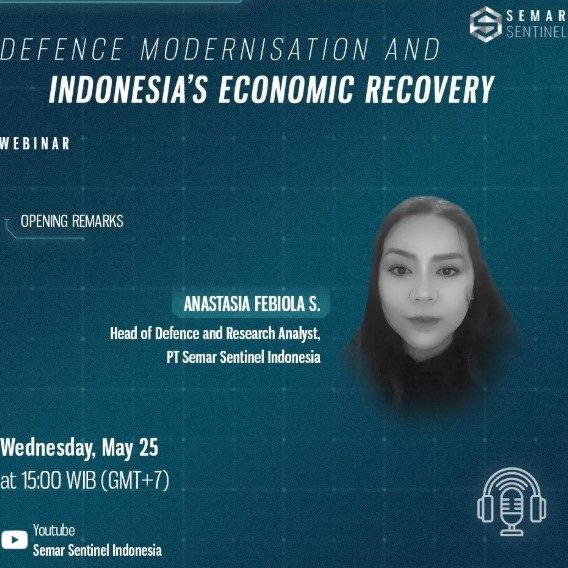
Anastasia Febiola S
Defence Modernisation and Indonesia’s Economic Recovery
Summary
Despite showing progress in domestic economic recovery, Indonesia is still facing turbulences such as the war in Ukraine, which is affecting the global commodity prices. Through the National Armed Forces (TNI) modernisation program, the domestic defence industry is expected to contribute to the post-pandemic economic recovery thanks to defence equipment procurement programmes.
Speaker
Alman Helvas Ali
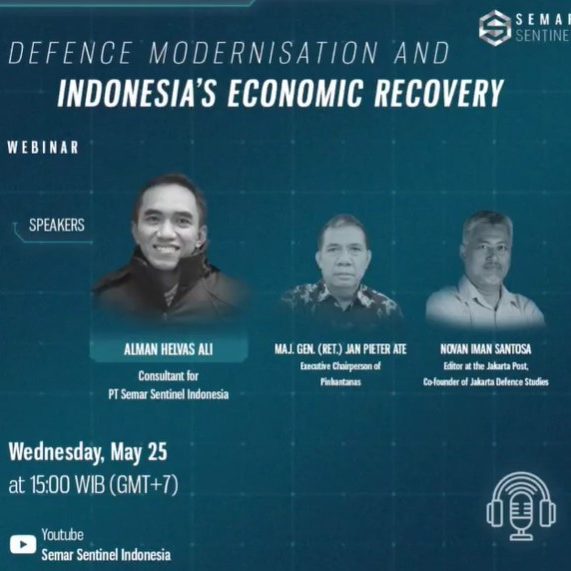
Alman Helvas Ali
Defence Modernisation and Indonesia’s Economic Recovery
Summary
In our latest webinar, Alman Helvas Ali argued that political aspects are essential in weapons procurement deals and decision-making process. M. Ali also stated that Indonesia should procure defence equipment in large quantities in order to maximise the technological and economic benefits of the acquisition program.
Speaker
Maj, Gen. (Ret.) Jan Pieter Ate
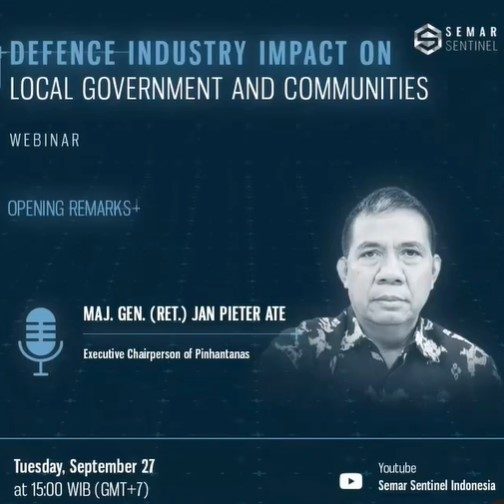
Maj, Gen. (Ret.) Jan Pieter Ate
Defence Modernisation and Indonesia’s Economic Recovery
Summary
In our latest webinar, Maj. Gen. (Ret.) Jan Pieter Ate argued that without sufficient budget allocated for the National Armed Forces (TNI) modernisation program, Indonesia might not be able to achieve its objective of a self-reliant defence industry. In addition, Indonesia should reduce the acquisition of foreign-made equipment to support the development of the Indonesian defence industry.
Speaker
Novan Iman Santosa
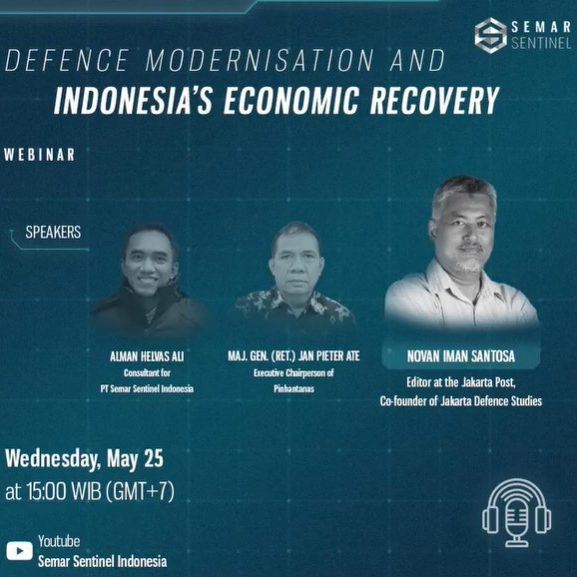
Novan Iman Santosa
Defence Modernisation and Indonesia’s Economic Recovery
Summary
Novan Iman Santosa, an editor for The Jakarta Post, stated in our latest webinar that it should be mandatory for public institutions requiring land or air assets to carry out their duties to prioritise domestic-made equipment. M. Santosa also argued that Indonesia should be able to balance production for commercial and strategic use should the country wish for defence autonomy.
